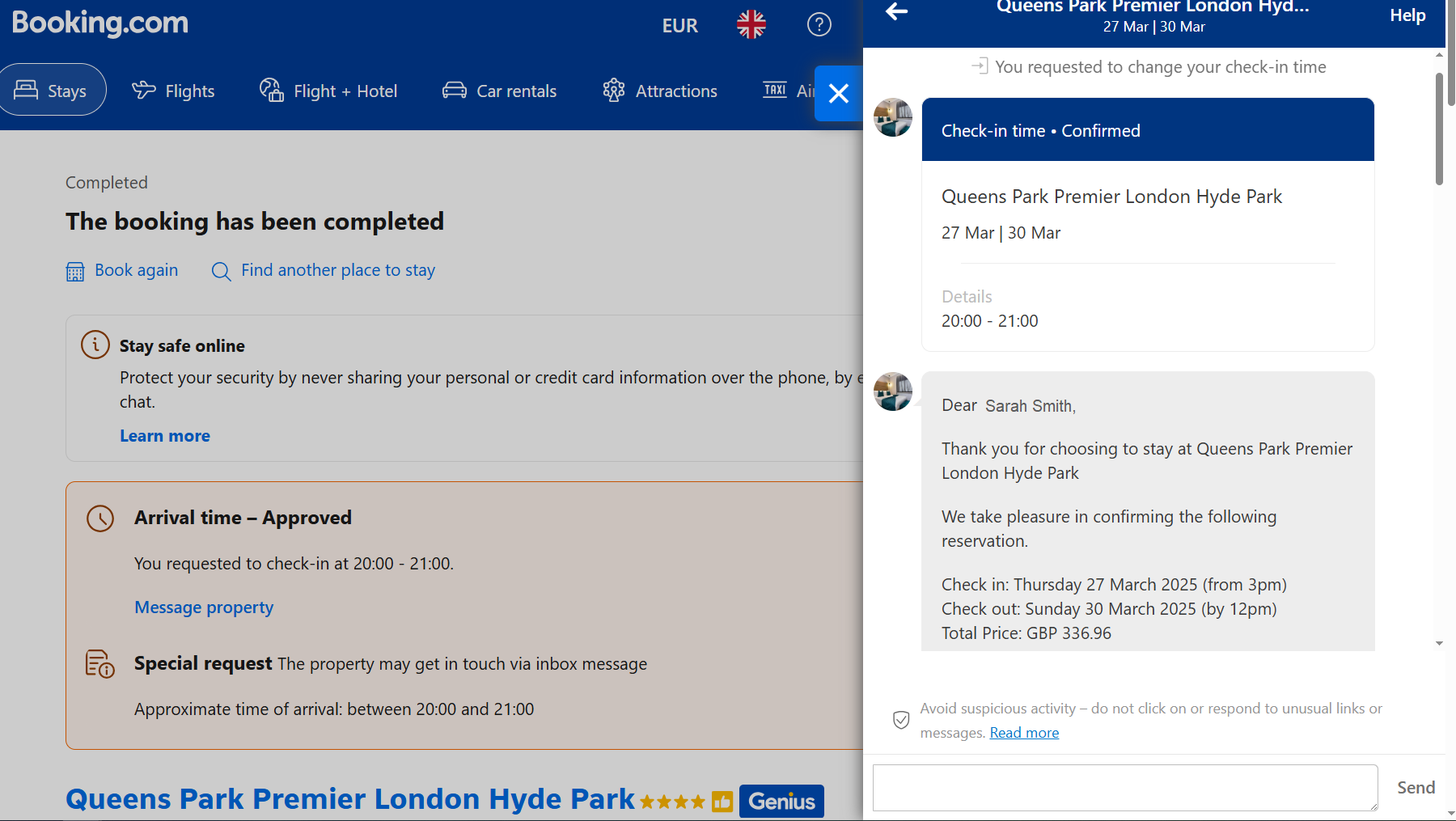About the Messaging API
The Messaging API acts as a communication bridge between your travellers and accommodation, enabling post-booking interactions once a reservation is created.
This API collection is currently available to selected partners as part of an early access pilot.
- Pilot phase - This API is under active development and may change.
- Limited access - This API is currently offered to a limited number of pilot affiliate partners.
- If you are not part of the pilot, you will not have access to this API collection.
- Contact our partnerships team to request access.
- Frequent updates - The documentation and API reference will be regularly updated throughout the pilot.
- Check the Changelog periodically for the latest updates.
The /messages API collection
The Messages API collection is seamlessly integrated into Demand API - Accommodation API collection, and enables secure, structured, and context-aware post-booking communication between accommodation hosts and guests, specifically tied to reservations.
Features
The Messaging API supports a wide range of capabilities:

Who is this for?
We recommend Messaging API integrations to existing Demand API Affiliate Partners who wish to provide a better post-booking experience that boosts loyalty and trust, while reducing customer services inbound.
Integration options
The Messaging API supports flexible integration approaches to suit a variety of partner needs.
Whether you're sending welcome messages, managing two-way conversations, or exchanging attachments, the API provides the necessary endpoints to build a seamless messaging experience into your system.
| Available integration modes | Description |
|---|---|
| ✅ Send messages | Send text messages from partners to guests, optionally with attachments. |
| ✅ Receive messages | Retrieve incoming messages either by conversation or via latest polling. |
| ✅ Message threading | Maintain full conversation context using conversation. |
| ✅ Attachments | Upload images to send with messages or download attachments from guests. |
| ✅ Conversation metadata access | View details about message participants, timestamps, and message status. |
| ✅ Reservation-based context | Use reservation ID to filter or identify message threads for specific stays. |
Benefits of integrating the Messaging API
Integrating the Messaging API into your system can bring some benefits such as:

The communication flow
Two-way communication is enabled after a reservation is created. Either party—traveller or host—can initiate contact.
 Accommodation to traveller
Accommodation to traveller
- 1. The accommodation sends a "welcome message" after booking is confirmed.
- Accommodation can use Booking.com extranet messaging centre or any other defined channel.
- Deliver messages to travellers in the defined channel (example: by email) via the messages/send endpoint.
- Fetch all messages from the property through Messaging API using the /messages/latest and /messages/latest/confirm.
2. Affiliate partner system uses Messaging API to:
Common accommodation messages
Property may communicate with the guest around the following topics:
Topic | Examples / Details |
|---|---|
| Welcome messages |
|
| Respond to special requests. |
|
| Confirm available amenities. |
|
| Inform about local taxes |
|
| Provides local recommendations |
|
Example of welcome message sent via the Booking.com platform:

 Traveller to Accommodation
Traveller to Accommodation
- 1. Travellers may start the conversation by sending a message via their email, through affiliate partners system or via the Booking.com platform.
- Deliver messages from/to travellers in the defined channel (example: by email) via the messages/send endpoint.
- Fetch all messages from the property through Messaging API using the /messages/latest and /messages/latest/confirm.
2. Affiliate partner system uses Messaging API to:.
Common traveller messages
Travellers may communicate with the accommodation around the following topics:
Topic | Examples / Details |
|---|---|
| Check-in details |
|
| Directions & transport |
|
| Booking modifications |
|
| Amenities & services |
|
| Special requests |
|
| Local recommendations |
|
| Payment & charges |
|
Message delivery channels
Messages sent via the Messaging API can be delivered through a wide range of channels based on your particular setup and/or preferences:
| Participant | Where messages appear |
|---|---|
| Guest |
|
| Accommodation (property) |
|
| Partner (you) |
|
Affiliate partners responsibilities
As a Managed Affiliate Partner integrating the Messaging API, you are responsible for ensuring successful message delivery to the end user.
You must:
- Guarantee reliable delivery of all messages sent through the API.
- Display messages clearly and without delay within your platform.
- Minimise delivery issues, which could negatively affect guest experience and partner performance.
Available endpoints
Messages endpoints
| Endpoint | Use it to ... |
|---|---|
| /messages/send | Send a new message starting a new conversation, or add a message to an existing conversation thread. |
| /messages/latest | Retrieve the latest messages across all conversations (up to 100). |
Confirms the message was received. This is required in order to receive new messages from POST /messages/latest. | |
| /messages/conversations | Retrieve the conversation history for the authenticated user up to 1 year after checkout. |
Attachments endpoints
| Endpoint | Use it to ... |
|---|---|
| /messages/attachments/upload | Upload an image to a conversation (for files smaller than 1MB). |
| /messages/attachments/metadata | Retrieve details about a previously uploaded image, such as name, type and size. |
| /messages/attachments/download | Download an attachment. |
What's next
Read the following guidelines to start getting familiar with the Messaging API:
- Get started - Try the messaging endpoints
- Refer to our detailed guides for Messaging API examples and best practices: